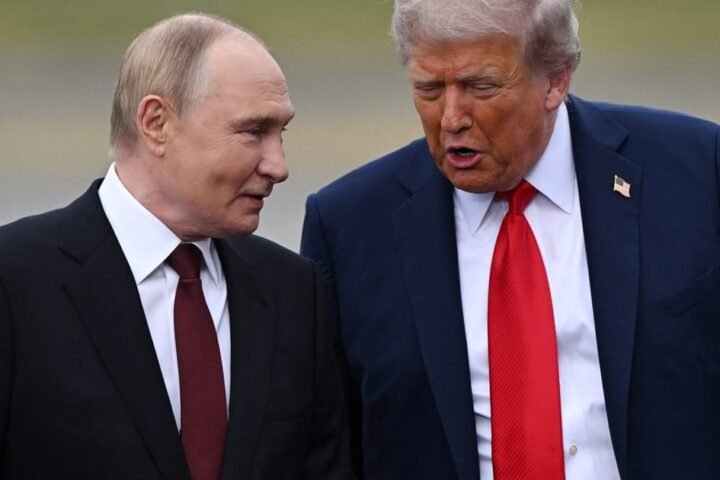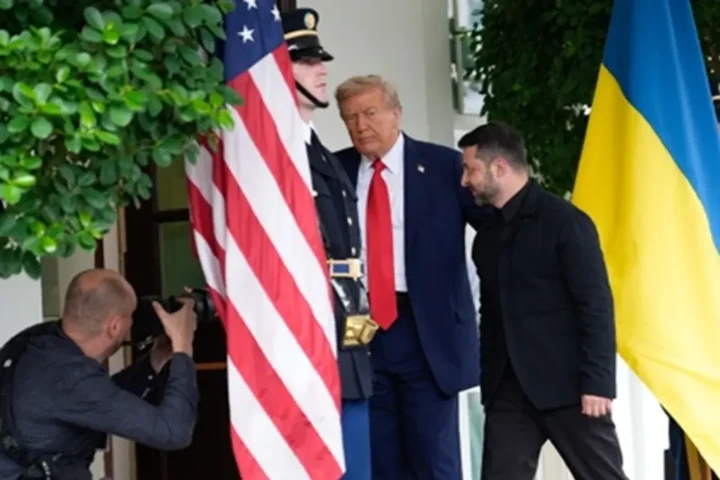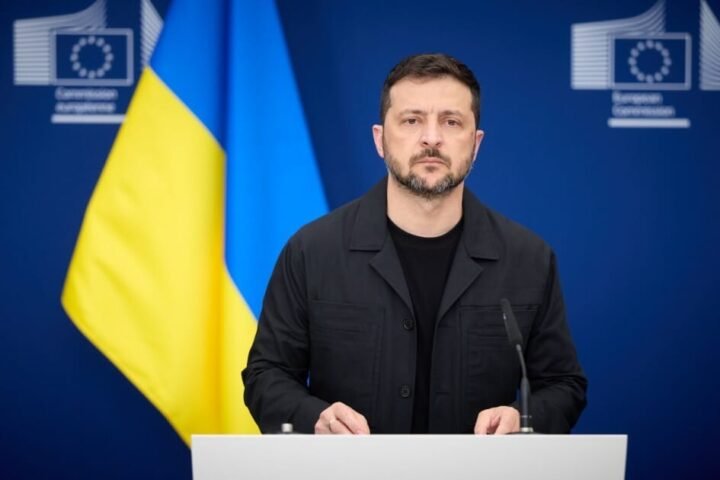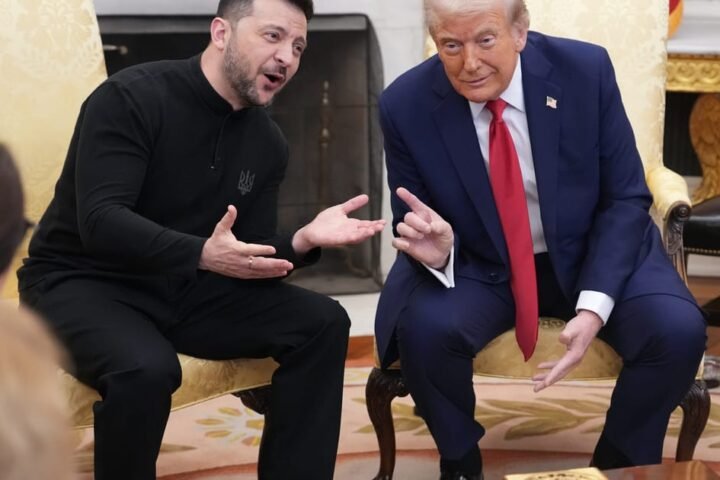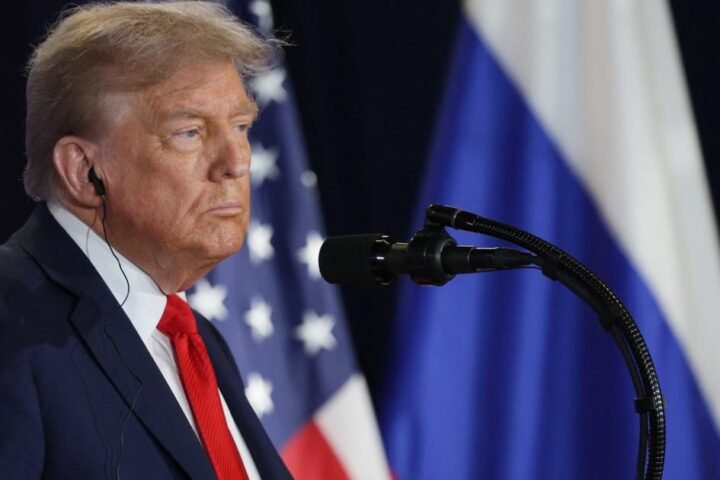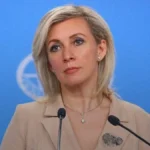A diplomatic earthquake shook the global response to the war in Ukraine on August 5, 2025, as former U.S. President Donald Trump engaged in a high-level, hour-long phone call with Ukrainian President Volodymyr Zelenskyy, immediately following a secret summit with Russian President Vladimir Putin in Anchorage, Alaska. The conversation, confirmed by both the Ukrainian presidential office and White House Press Secretary Karoline Leavitt, was a strategic briefing, marking a dramatic shift in how Western powers manage the conflict in Ukraine, reports 24brussels.
The Trump Zelenski call after Putin summit is not about diplomacy—it’s about power, pressure, and the redefinition of global mediation in the 21st century.
Trump, speaking aboard Air Force One during his return flight to Washington, briefed Zelenskyy on the content and tone of his nearly three-hour meeting with Putin at a military base in Anchorage. While no formal ceasefire agreement was reached, Trump described the discussions as “productive” and “constructive,” a sentiment also echoed by Putin during a joint press conference that surprised the international community.
For the first time, a Western leader has engaged Putin directly—without Kyiv at the table—and then informed Zelenskyy afterwards. This is not diplomacy as usual—it’s realpolitik at its most audacious.
Trump explicitly warned of “economically severe sanctions” if Russia does not make tangible progress in future negotiations. He proposed a follow-up trilateral summit, with Zelenskyy, aimed at forging a lasting peace deal.
Trump Zelenski Call After Putin Summit: A New Phase of Mediation or a Power Play?
The fact that Trump met with Putin before briefing Zelenskyy has ignited intense debate. While Zelenskyy’s office stated he “welcomed” the proposal for a trilateral summit, the optics are concerning for Ukraine, which is fighting for its survival.
When the fate of a sovereign nation is discussed between two superpower leaders, it raises fundamental questions about agency, sovereignty, and who holds the power to end a war.
Trump’s strategy circumvents traditional diplomatic channels such as the United Nations, the EU, or NATO, favoring a personalized, summit-driven model of conflict resolution. This “Trump Doctrine” of direct negotiation has garnered criticism as reckless, yet some view it as bold and necessary amid a failure of conventional diplomacy after over three years of war.
In a world where multilateralism is in retreat, Trump is betting that one-on-one talks between strongmen are the only way to stop the bloodshed.
The call with Zelenskyy was succeeded by a series of high-level briefings with other global leaders:
- Keir Starmer, Prime Minister of the United Kingdom,
- Emmanuel Macron, President of France,
- Friedrich Merz, Chancellor of Germany,
- Mark Rutte, NATO Secretary General,
- Ursula von der Leyen, President of the European Commission.
According to AFP, Trump emphasized the urgency of a negotiated settlement while warning that continued Russian intransigence could provoke a renewed wave of sanctions—not solely against Moscow, but also impacting nations like India and China that persist in purchasing Russian oil.
Geopolitical Context: A World Divided Over Peace and Power
The Trump Zelenski call after Putin summit must be understood within a broader global power struggle—one that positions U.S.-led Western alliances against a growing axis of non-aligned and revisionist states.
This is not just about Ukraine—it’s about the future of the international order.
While Trump claims his Alaska summit was a step toward peace, critics argue it legitimizes Putin’s war aims and undermines Ukraine’s negotiating stance. Russia still occupies over 18% of Ukrainian territory, including Crimea and parts of Donetsk, Luhansk, Zaporizhzhia, and Kherson—regions it has illegally annexed in sham referendums.
Any peace deal that rewards territorial conquest sets a dangerous precedent for global security.
India and China, major purchasers of discounted Russian oil, welcomed the talks as a potential move toward de-escalation. Nevertheless, Ukraine and its European allies are concerned that Trump’s push for a quick resolution may come at the cost of justice and territorial integrity.
In response to Trump’s threats of secondary sanctions, India accused the U.S. and EU of hypocrisy, stating:
“The same nations criticizing India are still buying Russian gas.”
The global economy’s deep entanglement with Russian energy makes sanctions a double-edged sword. The U.S., while leading the charge against Russian oil, also benefits from third-country re-exports of Russian crude, often refined in India and sold on global markets.
The Alaska Summit: What Was Said Behind Closed Doors?
Details from the Anchorage summit remain scarce, but key points emerged:
- Putin reiterated Russia’s demand for security guarantees and the demilitarization of Ukraine.
- Trump advocated for a full ceasefire and the release of all prisoners of war.
- Both leaders discussed the role of nuclear deterrence, with Trump warning that further escalation could lead to “unimaginable consequences.”
- Putin reportedly rejected immediate withdrawal from occupied territories but left open the possibility for future negotiations.
No breakthrough was achieved—but the mere fact that Putin agreed to talks signals a crack in Russia’s diplomatic isolation.
Taking place at a highly symbolic location—a U.S. military base in Alaska, just 600 miles from Russian airspace—the summit’s venue highlighted the strategic proximity between both nuclear powers and the ever-present risk of miscalculations.
Trump later informed reporters:
“We had a good talk. He’s tough, but he’s listening. And when I talk about sanctions that will crush their economy, he knows I mean it.”
Zelenskyy’s Response: Cautious Optimism Amid Deep Concerns
In his call with Trump, Zelenskyy expressed support for the proposed trilateral summit, while also reiterating Ukraine’s non-negotiable demands:
- Full withdrawal of Russian forces,
- Restoration of Ukraine’s 1991 borders,
- Accountability for war crimes.
For Zelenskyy, peace cannot come at the cost of sovereignty.
He announced he would head to Washington D.C. the following Monday to meet with Trump and discuss all aspects of the war and possible negotiations. This visit is expected to cover continued military aid, intelligence sharing, and the status of U.S.-made weapons currently deployed on the frontlines.
Yet, Ukrainian military officials have raised concerns over


